The 2015 MacBook Review
by Ryan Smith on April 14, 2015 10:15 AM ESTWindows Performance
Shifting gears from OS X, let’s take a look at performance under Windows. Though not every MacBook will be used with Windows, Windows gives us a wider selection of benchmarks to work with, and it gives us a chance to compare the MacBook to some contemporary PCs.
For our Windows comparison I’ve pulled in a number of results from our most recent Core M review, including other Core M laptops, the Haswell-U powered Surface Pro 3, and a couple of Broadwell-U powered laptops. Of particular interest is likely the Asus UX305, which is another Core M based laptop that uses a very similar build. At 13.3” it’s larger than the MacBook, but it is a similar aluminum fanless design.
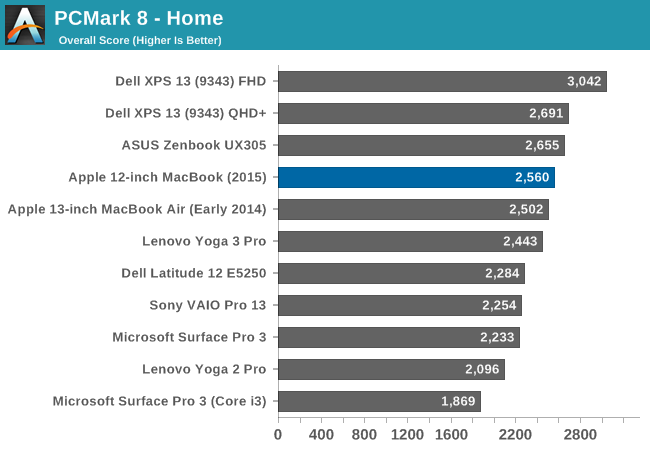
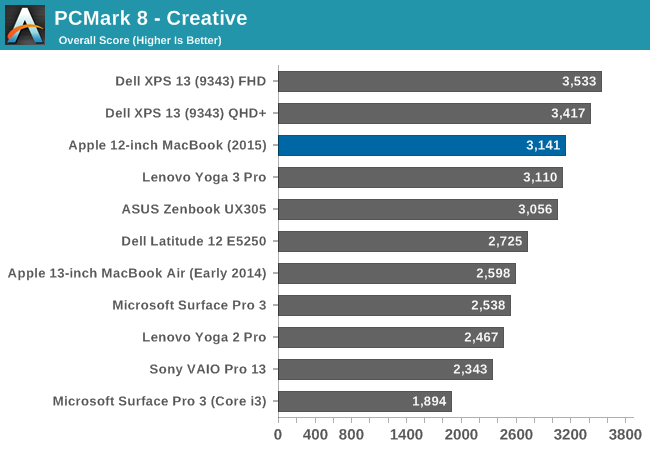
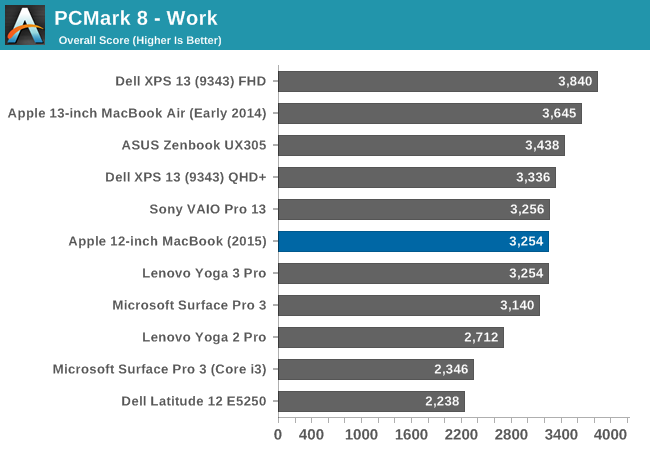
Depending on which sub-test we’re looking at, the PCMark workloads are a mix of bursty workloads, lightly threaded workloads, and heavily threaded workloads. As a result the MacBook and its Core M processor are given some opportunity to show off, and at other times is pushed back due to its cap on sustained performance.
The Home workload is one such light test, which plays into the MacBook’s favor. Here it’s towards the top of the charts, surpassing everything other than the Core M based Asus UX305, and then the more powerful Broadwell-U based Dell XPS 13s. I keep rattling on about workload types and this is a good example of why it matters, because in a light workload the MacBook is among the fastest of the ultra-portables, beating out many other Core M devices and also some Haswell based Ultrabooks. Put another way, in a light workload Core M can already deliver (and at times exceed) one-generation old Haswell Ultrabooks.
As for the Creative and Work workloads, the MacBook still places relatively well. Doing this well on the Creative workload was a bit of a surprise, since it’s the most demanding benchmark of the 3. I suspect we may be seeing a mix of dividends from the SSD and Core M’s GPU, Otherwise the lighter Work test actually has the MacBook farther behind the pack, with performance in-line with other Core M laptops, though not as exciting compared to the Ultrabooks.
Overall, between our OS X and Windows CPU benchmarks, what we’re finding is that the performance of the MacBook generally mirrors our expectations given what we know about its design and component selection. Given a light workload that allows the Core M CPU inside of the MacBook to turbo to its fastest speeds, it’s a very potent competitor in a small package, able to give all but the most recent Ultrabooks a run for their money. However heavier, sustained workloads drive a wider gap in between the two classes of devices, and in those cases the MacBook offers performance closer to Ultrabooks a 3-4 years old.
Shifting gears one more time, let’s take a look at GPU performance. GPU workloads present an interesting scenario for Core M, and by extension the MacBook. The underlying Intel HD Graphics 5300 GPU is a GT2 configuration, making it moderately powerful for an iGPU, however the power and thermal constrains on the MacBook means that the laptop doesn’t have the power required to run a GT2 GPU at full speed.
With the Broadwell CPU cores alone able to chew up 4.5W and then-some, a combined GPU+CPU workload will generally put the MacBook in a pinch. Consequently I don’t see the MacBook being used as any kind of gaming machine – the MacBook Air is undoubtedly a much stronger contender – but it’s useful to put this performance in context.
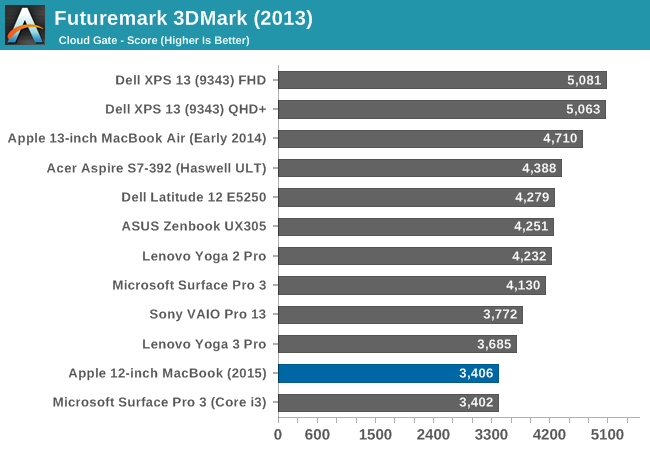
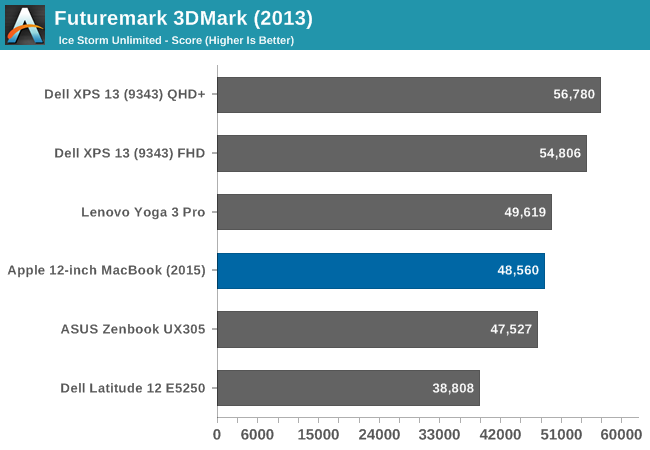
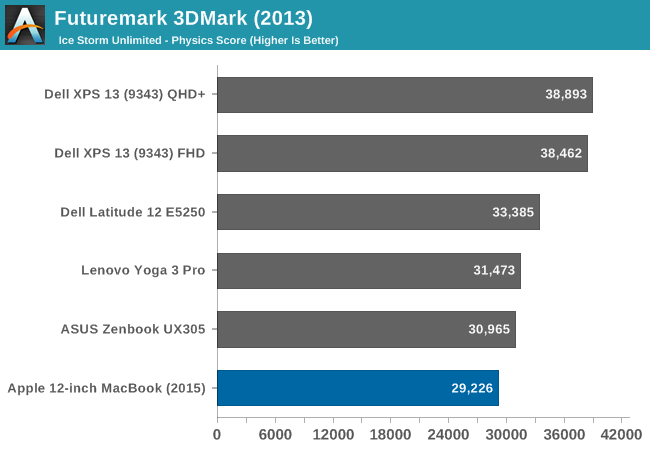
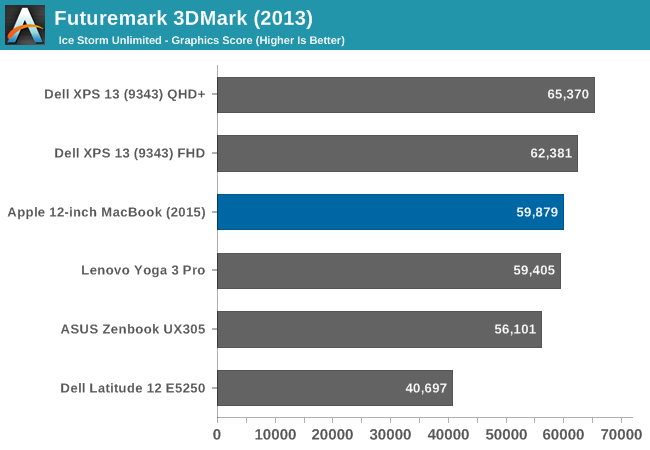
Our 3DMark scores handily illustrate this exact point. Facing significant power and thermal limits, the MacBook has to pull back in performance and consequently ends up near the bottom of our charts, versus its much better showing in PCMark. The 2014 MacBook Air 13” is some 38% faster at Cloud Gate, and on the newer Ice Storm benchmark the results aren’t much better. Of the two it’s worth noting that Cloud Gate is a much more complex and longer running benchmark, whereas Ice Storm is a quick running tablet-sized benchmark. Consequently Cloud Gate throttles harder and sooner, which is why the MacBook does relatively worse there. Overall the MacBook doesn’t even beat any of the other Core M laptops, which is a bit surprising. But nothing here is quite like the MacBook, so it’s somewhat different in its combination of small size and aluminum chassis.
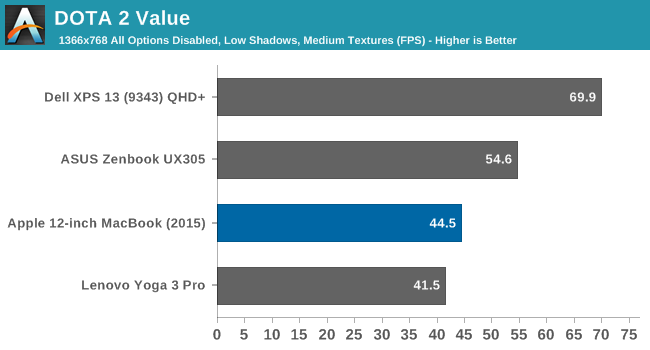
Meanwhile I have also run our DOTA 2 Value benchmark against our other Core M devices and the Broadwell-U based Dell XPS 13 for good measure. On an absolute basis 44.5fps is definitely playable for a game like DOTA, however on a relative basis this is a weaker showing than the UX305, not to mention the XPS 13. Compared to the UX305 the MacBook again appears to be throttling sooner and harder, whereas the Ultrabook-sized XPS takes full advantage of its higher power limits and better cooling.
Ultimately as we said when opening up our look at GPU performance, the MacBook’s GPU is potent on paper, but it simply doesn’t have the power and cooling capabilities needed to take full advantage of it. This means that while CPU performance isn’t too far removed from the Ultrabooks, GPU performance absolutely is.
Finally, I wanted to take one last look at performance relative to the tablets, this time from a GPU perspective.
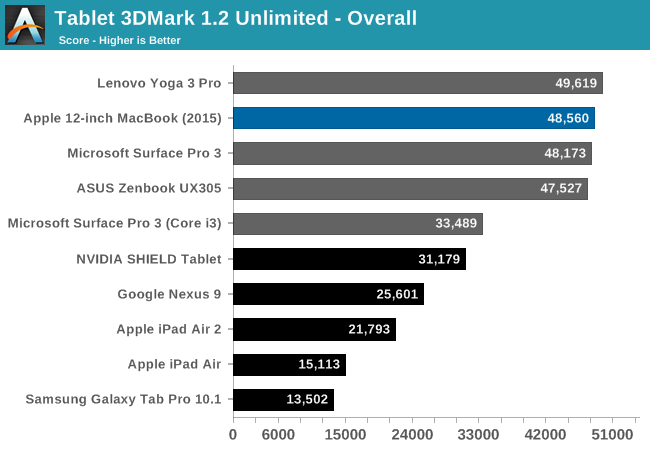
While the iPad Air 2 makes a good run on the MacBook in the web benchmarks, it and the other tablets are even more power limited than the MacBook, and as a result their GPU performance is even more constrained. The MacBook still has a better than 2x lead on the iPad Air 2 in this GPU benchmark, so judging from this it will be some time yet until an iPad's GPU performance catches up with this MacBook's.










354 Comments
View All Comments
Kumouri - Friday, April 24, 2015 - link
"MacBook Core-M performance is absolutely perfect for anyone doing mostly e-mails, office, browsing."Those three things were literally the tasks netbooks were made to do. Netbooks are perfect for email, office, and web because they have all the power you need and insane battery life. Which is exactly what the MacBook is.
ESC2000 - Wednesday, April 29, 2015 - link
But why would you pay $1300+ when your use case is email, Web and office? You should be able to get something far south of $1000 that can fly through those tasks (including apple's own MBA which of course isn't far south of $1000 but you pay the apple tax and it's still cheaper than this machine). ..maybe somewhat more to get 8 gb of RAM (although why would you need for that use case) and 256 gb of storage. If that's your use case and you buy one of these that suggests to me that you want to pay hundreds of dollars for the way it looks. ..not the end of the world and certainly your prerogative.lilmoe - Tuesday, April 14, 2015 - link
Meh. If I'm going to be more truthful, I'd say the new MacBook is actually worse than other netbooks as a value proposition. This isn't 2009. This device isn't a hybrid with a touchscreen like the Yoga 3 Pro. You're losing TOO MUCH for a design that isn't worth the price tag. Apple is making up for the *lacking factor* somewhat with a better screen and storage, but they should've used a better processor, made it a bit thicker, and put a larger battery. Oh wait, they ALREADY have a product like that; it's called the Macbook Air.I'd recommend an Air over this $1300 NETBOOK any day, every day. But Apple is being Apple here; they're trying to create a new, confusing, device category with this device. But I guess they can get away with it *because* they're Apple (ie: a luxury brand, as most people think of them).
Those who think that Apple is "hated" because ^one of their products is criticized are simply paranoid (too many of them actually). It's "easier", "lazier", and "more ignorant" to call out constructive criticism as "whiny anti-Apple" no?
modulusshift - Tuesday, April 14, 2015 - link
The fact that you think the storage is a salient point in comparing any computers that have SSDs simply shows how out of touch you are with what laptops actually need to be right now. SSD performance differences (assuming one isn't totally wrecked and TRIMless) are things you only really notice looking at two computers side by side. If they are reasonably sized, then they have the same practical performance for all consumer uses.That's the bit that gets me, though. You people are clearly expecting this thing to do a lot more than it actually does. Did you dislike the Surface Pro 3, too? Because that's a weaker device all around than this thing is, and heavier, and louder, and with an even worse keyboard and trackpad, for the same price matched to storage and RAM sizes. But yet it could handle prosumer level things (like music production) fairly well. I enjoyed light 3D games like Civ V at full resolution and settings. So will this. How the heck is it a netbook?
lilmoe - Tuesday, April 14, 2015 - link
"Did you dislike the Surface Pro 3, too? Because that's a weaker device all around than this thing is"There's a think line between criticism and fanboyism. The latter applying to you.
lilmoe - Tuesday, April 14, 2015 - link
edit: There's a thin** line....you guys really need an edit button. Like REALLY.
Jumangi - Wednesday, April 15, 2015 - link
I agree the functionality compromises to keep with Apple's obsession for thin has reached the point of being dumb now. But the Apple fanboys will say this is genius and the "future". No thanks.Notmyusualid - Thursday, April 16, 2015 - link
+1Notmyusualid - Thursday, April 16, 2015 - link
Sign me up as lazy / ignorant then!Looks like a netbook to me. Or ultrabook if you press me.
And with that CPU, I'd imagine it'd choak trying to encrypt some videos for my phone to take on a road trip with me.
Other than that, I'm impressed with that keyboard layout, especially with the new keys they've designed.
Unless it was free though - I'd not place my money anywhere NEAR a device with one peripheral port, especially one aimed at being so mobile (think not wanting to carry extra hubs etc).
lilmoe - Tuesday, April 14, 2015 - link
Honestly? What's the difference between a $300 and a $3000 laptop? Aren't both called "Laptops"?This is totally a netbook, albeit better built with somewhat better performance. But absolutely NOT a laptop nor the cooler sounding "crossover", whatever that is. This isn't a hybrid either, nor does it have (or makes use of) a touchscreen.
You're losing too much with this product. Battery life isn't as good as similarly priced, similarly sized laptops (even from Apple), and the performance totally off the mark.
You're being too diplomatic.